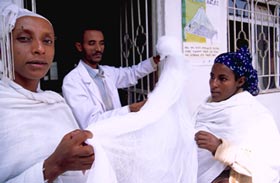
Malaria
 Building
sustainable markets for insecticide-treated nets (ITNs)
Building
sustainable markets for insecticide-treated nets (ITNs)
AED (now FHI 360) was at the forefront of early initiatives to involve the private sector in the prevention of malaria through the NetMark Project. We partnered with multinational net and insecticide manufacturers, national product distributors, and national malaria control programs to make quality ITNs widely available at affordable prices in seven African countries. Our public-education efforts reached over 200 million people and commercial partners sold over 60 million ITNs (26 different brands) in seven African countries between 2002 and 2009. For those unable to afford the full commercial price, we created a discount voucher system that 2.1 million families used to purchase ITNs from commercial shops. This successful and innovative initiative had a voucher redemption rate of over 90 percent.
Under the MAPS Project in Nigeria, we ensure increased use of long lasting insecticidal nets LLINs by pregnant women and children under the age of five, through behavior change communications and improved supply chain management. In addition, MAPS will help improve malaria case management in both private and public health-care facilities by increasing the use of diagnostics tools and intermittent preventive treatment for pregnant women, and strengthening program management—including monitoring and evaluation.
Facilitating technology transfers to local manufacturers
AED's commercial distribution partners initially relied mostly on imported ITNs. NetMark, however, encouraged local manufacturers to meet international standards so they could become suppliers to the ITN program. We supported factory assessments and quality improvement from textile engineers to all major net manufacturers in Africa. In Nigeria, AED helped several net-stitcher associations identify sources of World Health Organization-approved netting, insecticide kits, heat sealers, and—as they became available—LLIN treatment kits. ITN production by these stitchers went from zero in 2004 to 2.1 million in 2008.
Working with industry on product development
Medicines for Malaria Venture contracted with AED to conduct consumer research to ensure correct and consistent use of a new combination anti-malaria therapy (Field-Testing of Anti-Malarial Packaging in Malaria-Endemic Countries). We not only designed the usability and labeling studies, but also helped create packaging, labels, and instructional inserts designed for illiterate or semi- literate consumers. AED (now FHI 360) helps companies conduct consumer research to guide the development of new antimalarial products. Bayer CropScience contracted with AED in order to help ascertain consumer acceptability of a new LLIN (Assessing Consumer Acceptance of LLINs).
Raising awareness at the community level
Under the T-MARC Project, AED implemented the Kataa Malaria (Reject Malaria) Campaign, a malaria prevention campaign in Zanzibar and its surrounding islands developed in conjunction with the Zanzibar Malaria Control Program. The campaign reached 400,000 people through a house-to-house outreach effort, and 250,000 nets were distributed and hung over beds. One of the Zanzibar islands reported that in the first nine months of 2006, the number of malaria were almost 90 percent lower than in the previous year.
Using AED's Social and Behavior Change Communication (SBCC) framework, the MAPS Project is working closely with local Nigerian institutions to implement targeted campaigns and achieve lasting, positive change in malaria-related behaviors.
Creating an enabling environment for commercial distribution of ITNs
The NetMark project advocated for African nations to include the commercial sector in their malaria plans and to reduce taxes and tariffs on ITNs. AED's Malaria Taxes and Tariffs Advocacy Project (M-TAP) used evidence-based policymaking to identify and minimize the negative impact of taxes and tariffs, as well as non-tariff barriers, on anti-malarial commodities, including:
- ITNs and LLINs
- Raw materials and machinery for ITN production
- Artemisinin-based combination therapy
- Malaria prevention medicines
- Insecticides for indoor residual spraying
- Rapid diagnostic tests.
We would like to offer our expertise to your organization. If you would like to work with the FHI 360 Center for Private Sector Health Initiatives or learn more about the expertise of our staff, please contact pshi@fhi360.org.
Download the Malaria fact sheet (PDF, 509kb)